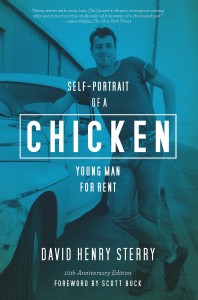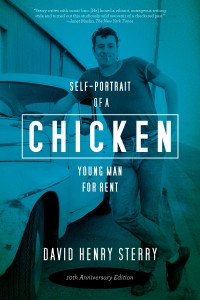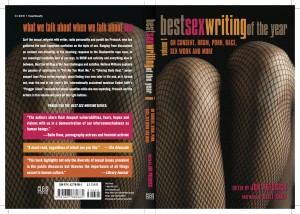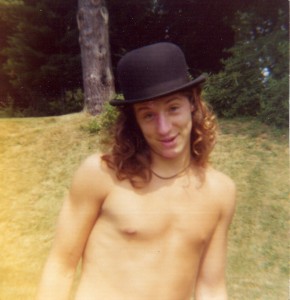The Chicken Clucks Defiant: A book review of Chicken: Self-Portrait of a Young Man for Rent, by David Henry Sterry (to buy book click here)
Ann Lucas
San José State University
San José, California
As the subtitle of David Henry Sterry’s Chicken suggests, this book is a memoir of the author’s year working as a teenaged prostitute. At the age of 17, having arrived in Los Angeles to start college, Sterry found himself homeless when planned living arrangements fell through. In short order he was lured into a stranger’s home, raped, and robbed of his last twenty-seven dollars. Escaping, Sterry was offered refuge and a job by the manager of a fried chicken restaurant. In what Sterry now recognizes as a great cosmic joke, his boss also happened to be the purveyor of human chickens (i.e., a pimp); leaving fast-food wages behind, Sterry soon was charging $100 per hour for his services. His encounters with the colorful, seedy, bizarre, enterprising, desperate, and pathetic who lived on both sides of respectability in 1970s Southern California provide a framework and narrative thread for Sterry’s recounting of how his year in sex work affected him materially, emotionally and interpersonally. Throughout the book, Sterry’s accounts of assignations with clients and dilemmas in balancing his identities as rent boy and college student are interspersed with his childhood memories of growing up in an English immigrant family which is slowly falling apart. These episodes from his childhood and adolescence help provide a context, if not necessarily a cause, for his outlook on life and his foray into sex work. The book concludes with his decision to leave the sex industry.
The writing style in Chicken is brash and engaging. Reminiscent of “gonzo journalism” and Lewis Carroll, Sterry’s style includes vivid descriptions (“Frannie, perched like an anorexic bird in the plumage of her couch”) (p. 33), trenchant metaphors (Sisyphus and leaky buckets), creative compound words (“nuthugging elephantbells”) (p. 6 and passim), and a taste for alliteration (“black businessmen bustling by briskly”) (p. 6). Yet the book is more than just flashy, over-the-top recounting of colorful anecdotes. Rather, Sterry’s writing style serves his substance well, clearly evoking the milieu of 1970s sexual-revolution-era Hollywood and giving the reader a definite sense of his personal style and character as a lost but resourceful late-adolescent. At the same time, the book is visceral and brutally honest about Sterry’s emotional and physical ordeals during his year as a sex worker. He expresses both sympathy and anger for his clients; in regard to his own behavior, he is subtly introspective, smoothly moving between an account of his feelings at the time and a retrospective evaluation of his actions and motives. While his account does not appear to temper the meanness, sadness or vapidity of many of his customers, he does not shrink from reporting his own failings, either. For example, his recounting of his displaced rage on the basketball court is unflinching and heartbreaking (pp. 181-185).
Sterry’s book reflects the truism that experiences shape perspectives. His views of his year as a “chicken” reflect, among other things, his age at the time, the circumstances in which he began the work (voluntarily, but also with some sense of desperation), his feeling of parental rejection and need for love, his recent sexual assault, his interactions with others, as well as the tenor of the times and his location. Thus, despite the fact that many young people are rejected by their parents, find themselves on the streets, and engage in prostitution, this Chicken is not an “everyman chicken,” but rather an account of a unique person in a unique situation.
That said, Chicken can also be placed in a larger literary and socio-cultural context. Sterry’s memoir is important for many reasons, one of which is that it is the first account of a young male prostitute working primarily with a female clientele. We have several examples of memoirs and lightly fictionalized first-person accounts by female sex workers (see, e.g., Almodovar 1993; French 1988; Quan 2001; Hollander 2002) and by male hustlers serving a male clientele (see, e.g., Whitaker 1999; Lawrence 1999). Sterry expands the genre of work created by these “sex worker literati” (Kuczynski 2001); in offering his unique story, he also enables those familiar with the genre to speculate about commonalities and differences among prostitutes (and among clients) as we compare his story to others. For example, like countless others, Sterry refers to his time in prostitution as “the life,” (Sterry, p. 125) indicating a recognition that prostitution in the U.S. is no simple vocation, but rather has larger implications for its practitioners and a broader significance in society. Indeed, Sterry’s book helps demonstrate why “the life” is often used as a synonym for prostitution: illegal and stigmatized, for most prostitution is no mere way to pay the rent. Instead it may involve false names and cover stories; the threat or actuality of violence; uncertainty due to the risk of arrest, eviction, expulsion, loss of custody, deportation and the like; emotional distance from loved ones; and inner turmoil, just to name a few. Whether a prostitute embraces or regrets his/her work, the fact of stigma and criminality often do lead prostitutes into “the life” of prostitution because of the things they must do to conceal their activities from others and the opportunities they forego because of the risk of disclosure.
In contrast, unlike many other “sex positive” authors of prostitution memoirs, Sterry reports that he had only one client who was not hateful (p. 125). Among myriad possibilities, Sterry’s claim may suggest that women as commercial sex consumers tend not to be appreciative of the services they receive; that the kind of women, particularly in the 1970s, who could conceive of, afford, and follow through on paying for sex are a unique sample of mostly troubled, superficial, nihilistic or misanthropic individuals; that teenaged sex providers are particularly taken for granted; or that something specific to Sterry–his own misgivings about his work, the way in which his manager procured customers, etc.–influenced Sterry’s interactions with and perceptions of his clients. While the reader can do little more than speculate about this matter, this kind of contrast nonetheless demonstrates the usefulness of Sterry’s book in helping those among us who research, observe, theorize about, or participate in the sex industry to (re)consider how specific or generalizable our own findings, conclusions, beliefs and experiences may be.
The complex relation between the specific and the general is implicated in other ways by Sterry’s memoir. For example, some readers may feel that Sterry wrongly sentimentalizes non-commercial consensual intercourse, drawing too stark a dichotomy between the nastiness of paid sex and the delights of unpaid sex. Remembering having sex with his college girlfriend for the first time, Sterry writes: “This is so different from working sex. That’s dank dark distant and mechanical, and I have to pump myself up into a loverstudguy to do it.” (p. 85) As people from all spectra of human experience have pointed out, including this reviewer (Lucas, in press), commercial sex is not always or necessarily impersonal and alienating, nor does non-commercial sex always or necessarily promote sharing, bonding and interpersonal connection. Yet Sterry should not be faulted for his viewpoint here, because, with few exceptions, his book consistently makes clear that this story is his alone; he never claims to speak for all rent-boys, rape victims, or homeless teens. Moreover, many teenagers see the world, including the world of sex, as black and white. Despite Sterry’s greater exposure than most adolescents to the extremes of sexual practice, given his conflicted emotions about his behavior, at this time he probably also viewed paid and unpaid sex strictly as a study in contrasts. Thus, rather than being faulted for portraying this view in his memoir, Sterry merits praise for recreating this duality so accurately.
However, when he ventures beyond his specific story, Sterry is on unstable ground. Sterry reports that “[o]ver ninety percent of sex workers have been sexually abused” (p. 82). This figure is wholly unsubstantiated. Studies reporting such a high rate of abuse have consistently proved invalid due to poor design, questionable administration, vague or over-general definitions of abuse, and inadequate sampling. Where even roughly accurate, such figures describe only specific and extremely limited groups of sex workers. For the population as a whole, it is impossible to know how many sex workers have been abused–even with precise definitions of abuse–because it is impossible to conduct random sampling or to establish that a sample is indeed representative of the larger population. Sex workers in general, and prostitutes especially, do not consistently admit involvement in the sex industry. As such, the size, spread, and basic demographic characteristics of this population are impossible to specify, including its rates of abuse. Moreover, it is probable that sex workers who are abuse survivors are more likely to come to researchers’ attention through contacts with law enforcement, safe sex outreach workers, drug counselors, and others, because their history of abuse may make them less able to conceal their activities, more at risk for problem behaviors, and more open to outreach workers offering help. In other words, researchers often start with a skewed sample. Finally, to the extent any generalizations are possible, they are most reliable for female prostitutes. Male sex workers are an especially poorly understood group, in part because they are rarely studied except in connection with HIV and AIDS. Absent more information about male prostitutes as a group, one cannot assume that findings applicable to women also describe their male counterparts.
However, this is a minor flaw in an otherwise outstanding work. In terms of its larger lessons, Sterry’s memoir reinforces what other sex workers and academics have said in their own ways about the many problems of stigma and the need for society to recognize prostitution as a legitimate and valuable profession when freely chosen. In recounting his yin-yang experiences and emotions regarding sex work, Sterry shows us what a minefield the terrain of prostitution can be for its practitioners. Like other prostitutes, both male and female, Sterry’s self-esteem was both enhanced by (or through) prostitution, and also, sometimes simultaneously, diminished–especially when his clients made clear their lack of regard for him and his ilk. Sterry’s memoir suggests that when prostitution is not fully chosen or continued, and when it is practiced by those who are vulnerable, immature, living in precarious conditions or otherwise at risk, it is a practice that may be highly fraught with tension and uncertainty. That is, a person who is both young and ambivalent about his or her work as a prostitute is likely to be particularly susceptible to societal condemnation, stigma, and self-doubt. These forces, in turn, can make it more difficult for such a person to navigate the terrain of prostitution successfully, find or create a support network, make decisions to promote well-being, negotiate successfully with clients, learn which clients (s)he prefers or how to select them, and the like.
Again, this is not to fault Sterry or to diminish his successes and ingenuity in chickenhood. Nor is it to suggest that we can reach dispositive conclusions based on one set of experiences. Rather, it is to insist that we not discount this set of experiences as simply a compelling coming-of-age story, another example of triumph over adversity, or a Day-Glo® portrait of seamy Hollywood excess. While it may be these things, Chicken is more. It expands our understanding of who does sex work and what it involves; of how family dislocation, dysfunction and desertion affect children and adolescents; and of the complex interplay between social norms, sexual practices, “deviant” behavior, and identity. Academics might use Chicken profitably to help students explore non-fiction and memoir writing, or substantively in courses on gender, sexuality, adolescence, deviance, the sexual revolution, the 1970s, southern California, and related topics. As a floodlit slice of life or an object lesson about attempts to counterbalance (dare I say “straddle”?) propriety and impropriety, Chicken is highly recommended.
References
Almodovar, Norma Jean. 1993. Cop to Call Girl: Why I Left the LAPD to Make an Honest Living as a Beverly Hills Prostitute. New York: Simon & Schuster.
French, Dolores, with Linda Lee. 1988. Working: My Life as a Prostitute. New York: E.P. Dutton.
Hollander, Xaviera, with Robin Moore & Yvonne Dunleavy. 2002 [1972]. The Happy Hooker: My Own Story. New York: Regan Books.
Kuczynski, Alex. 2001, November 4. The Sex-Worker Literati. New York Times, sec. 9, p. 1. Retrieved May 28, 2003 from LexisNexis Academic database.
Lawrence, Aaron. 1999. Suburban Hustler: Stories of a Hi-Tech Callboy. Warren, NJ: Late Night Press.
Lucas, Ann. In press. The Currency of Sex: Prostitution, Law and Commodification. In Martha M. Ertman & Joan C. Williams (Eds.), Commodification Futures: The Role of Markets in Love, Sex, and Other Areas.
Quan, Tracy. 2001. Diary of a Manhattan Call Girl: A Nancy Chan Novel. New York: Crown Publishing.
Whitaker, Rick. 1999. Assuming the Position: A Memoir of Hustling. New York: Four Walls Eight Windows.
 “I walk all the way up Hollywood Boulevard to Grauman’s Chinese Theatre: past tourists snapping shots; wannabe starlets sparkling by in miniskirts with head shots in their hands and moondust in their eyes; rowdy cowboys drinking with drunken Indians; black businessmen bustling by briskly in crisp suits; ladies who do not lunch with nylons rolled up below the knee pushing shopping carts full of everything they own; Mustangs rubbing up against muscular Mercedes and Hell’s Angels hogs. It’s a sick twisted Wonderland, and I’m Alice.”
“I walk all the way up Hollywood Boulevard to Grauman’s Chinese Theatre: past tourists snapping shots; wannabe starlets sparkling by in miniskirts with head shots in their hands and moondust in their eyes; rowdy cowboys drinking with drunken Indians; black businessmen bustling by briskly in crisp suits; ladies who do not lunch with nylons rolled up below the knee pushing shopping carts full of everything they own; Mustangs rubbing up against muscular Mercedes and Hell’s Angels hogs. It’s a sick twisted Wonderland, and I’m Alice.”








